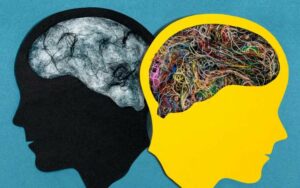Post-traumatic stress disorder (PTSD) and bipolar disorder are two mental health conditions that often get confused. They share some common symptoms, but they are two very different disorders. In this blog post, we will discuss the differences between PTSD and bipolar disorder, as well as the similarities. We will also explore how these two disorders can intersect. If you or someone you know is struggling with either of these conditions, it is important to seek help from a qualified professional.
Contents
What Is Bipolar Disorder?

Bipolar Disorder is a mental illness that is characterized by extreme mood swings. These mood swings can range from periods of severe depression to periods of mania. Bipolar Disorder is a very serious condition that can lead to hospitalization, and in some cases, suicide.
Bipolar disorders are often comorbid with other mental illnesses, such as anxiety disorders, substance abuse disorders, and eating disorders.
What Is PTSD?
PTSD is a mental illness that is characterized by severe anxiety, flashbacks, and intrusive thoughts. PTSD can be caused by a variety of traumas, such as military combat, sexual assault, or natural disasters.
Also, PTSD can lead to several serious problems, such as social isolation, job loss, and substance abuse. PTSD is also often comorbid with other mental illnesses, such as depression and anxiety disorders. This means that people with PTSD are more likely to also have other mental health problems.
What Is The Relationship Between Bipolar Disorder and PTSD?

The relationship between bipolar disorder and posttraumatic stress disorder (PTSD) is a complicated one. While it is true that people with bipolar disorder are more likely to experience trauma than the general population, it is also true that people with PTSD are more likely to develop bipolar disorder. This chicken-and-egg relationship can make it difficult to tease out which condition came first.
There are a few theories about how these two conditions might be linked. One possibility is that they share certain risk factors, such as a history of abuse or exposure to other traumatic events. Another possibility is that the symptoms of PTSD can trigger manic or depressive episodes in people with bipolar disorder.
Some reports may suggest that people with bipolar disorder are more likely to develop PTSD after a traumatic event, but it is important to remember that this does not necessarily mean that one condition causes the other. It is also possible that the two conditions share certain risk factors or that the symptoms of one condition can exacerbate the symptoms of the other.
Also, the link between bipolar disorder and PTSD may be because both conditions are often treated with similar medications, such as antidepressants and mood stabilizers. This could explain why some people who have one condition are more likely to develop the other.
Common Reasons for PTSD and Bipolar Disorder
The two disorders share some common symptoms and causes. For example, both can be triggered by a traumatic event. Some other differences are:
Abuse
One of the most common reasons people develop PTSD is abuse. This can be sexual, physical, or emotional abuse. Unfortunately, bipolar disorder is also commonly caused by abuse. Studies have shown that abused children are more likely to develop bipolar disorder than adults.
Genetics
Another factor that can contribute to both disorders is genetics. If you have a family member with either PTSD or bipolar disorder, you’re more likely to develop the condition yourself.
Brain Structure
Changes in brain structure have also been linked to both disorders. For example, people with PTSD often have smaller hippocampus’ than average. This part of the brain is responsible for memory and learning. A small hippocampus has been linked to problems with these functions. Similarly, people with bipolar disorder often have changes in the structure of their prefrontal cortex. This part of the brain is responsible for decision-making, planning, and other executive functions.
Trauma
An event that causes psychological trauma is often at the root of both PTSD and bipolar disorder. This can be something like abuse, a natural disaster, or a car accident. If you go through something traumatic, it’s important to get help from a mental health professional to prevent these disorders from developing.
Common Treatment For PTSD And Bipolar Disorder

Treating PTSD can be difficult, as there is no one-size-fits-all approach that will work for everyone. However, several common treatments are often used to help people with PTSD.
One of the most common treatments for PTSD and Bipolar Disorder is exposure therapy. This type of therapy involves gradually exposing the person to the thing that they are afraid of. For example, if someone has PTSD after being in a car accident, they may start by driving around the block. Over time, they would work their way up to driving on the highway. The goal of exposure therapy is to help the person confront their fears and learn that they can cope with them.
Cognitive behavioral therapy (CBT) is another common treatment for PTSD and Bipolar Disorder. This type of therapy helps the person to change the way they think about their trauma. For example, a person with PTSD may believe that they are to blame for what happened to them. CBT can help them to challenge these negative thoughts and learn to see their trauma in a more realistic light.
Medications can also be used to treat PTSD. Antidepressants, anti-anxiety medications, and sleep aids are often prescribed to help people with PTSD. These medications can help to improve symptoms such as depression, anxiety, and insomnia.
PTSD and Bipolar Disorder are serious conditions that can have a profound impact on a person’s life. However, there are treatments available that can help people manage their symptoms and live fulfilling lives.
Conclusion
PTSD and bipolar disorder are both mental disorders that can cause a great deal of distress and disruption in a person’s life. While there are some similarities between the two disorders, there are also significant differences. It is important to seek professional help if you think you may be suffering from either PTSD or bipolar disorder, as treatment can be very effective in managing the symptoms and helping people to live fulfilling lives.
Hope this article was of help to you! If you are suffering from mental health disorders, you may seek help from Therapy Mantra. We have a team of highly trained and experienced therapists who can provide you with the tools and skills necessary for overcoming mental health disorders. Contact us today to schedule an online therapy or download our free Android or iOS app for more information.


